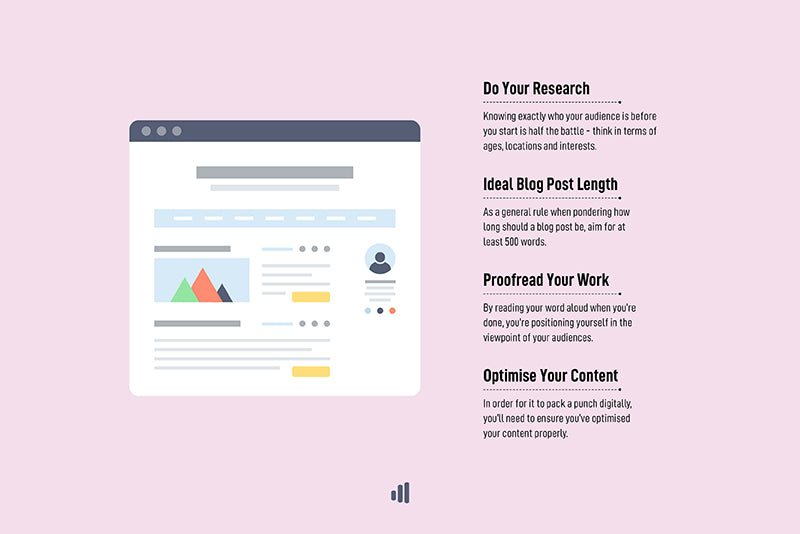If you’re new to article writing and the SEO online arena, it can be difficult to navigate the do’s and don’ts – so how long should a blog post be?
As a brand or business, the idea of regular blogging is to construct a text that is both engaging, and reaches the right audience through proper optimisation. Over time, the readers will come to trust your brand, and will in turn encourage both new and repeat clients. It’s not the place for the hard sell – blogging for business is how you build trust with consumers and position yourself as the go-to authority within your industry.

According to market leader Hubspot, brands are thirteen times more likely to see positive return on investment when they put regular blogging as a top priority. However, there’s a number of reasons as to why brands fall flat with their blog content, and it usually either boils down to a lack of time, passion, experience or resources – even though the potential rewards can be lucrative.
Thus, if you’re just starting out on your blogging journey, you’ll no doubt have some questions. What is keyword research? What does optimising an article mean? And of course, the ever popular one – how long should a blog post be?
Your Guide To Blog Structures
Whether you’re a new or existing brand trying to get seen by consumers on the world wide web, relying on paid advertising is only going to get you so far. In comparison, blogging for SEO is a cost effective strategy that’s built for the long game. While there are no shortcuts, the good news is that writing a batch of articles for your website is simply about getting started.
There’s a few key no-brainers of course, such as paying attention to spelling and grammar, fact checking any statistics or information you include, and writing how you speak to craft an engaging narrative. However, there are a few technical specs to take note of if you’re blogging as a beginner.
Do Your Research – Knowing exactly who your audience is before you start is half the battle – think in terms of ages, locations and interests. This will greatly help with your keyword research, or knowing what to write about that resonates with both new and existing audiences. In order to pack a punch online, your blog needs to target a few key phrases in order to reach people who will actually read it.
Ideal Blog Post Length – This is a tricky one, and the answer depends on who you ask. As a general rule when pondering how long should a blog post be, aim for at least 500 words. This is because Google crawls your content daily, and the more you write, the more information the search engine has to work with. High quality blog posts of 1000 words or more usually work in the publisher’s favour, with more headings and backlinks to attract the right attention.
Proofread Your Work – Remember, proofreading isn’t just for spelling checks. By reading your word aloud when you’re done, you’re positioning yourself in the viewpoint of your audiences. If you have to take a breath while reading a sentence, add a comma or hyphen. Try to break up big paragraphs with things like quotes, infographics and even bullet point style lists to improve your blog’s overall ‘readability’.
Optimise Your Content – When publishing a blog online, don’t forget about the technical stuff. In order for it to pack a punch digitally, you’ll need to ensure you’ve optimised your content properly – think Google friendly titles, description, meta data, backlinks, length and imagery. Avoid writing click bait style articles that over target your selected keywords, and format your blog in a way that is both technically friendly and user friendly.

As the world continues to rapidly shift online, trying to do business in this space is a whole new ball game when compared to the traditional bricks and mortar methods. As a result, getting seen online involves much more than having a slick website, and brands simply need clear, consistent and on brand content like blogs, videos and graphics in order to reach the top of the search engine results.
While it’s certainly not an easy task if you don’t know what you’re doing, the good news is that outsourcing your brand’s content marketing needs is actually easier than you might think.
Outsourcing Your Blog Content With The Professionals
Producing quality, consistent and on brand content takes time, effort, experience and resources – and you’re not alone if you can’t quite commit to that. Avoiding blogging for business altogether may actually be doing your brand a disservice, but thankfully – outsourcing and in turn investing in a solid content marketing strategy has never been easier.
Here at Content Hive, producing top quality digital content is exactly what we do best. We have itemised a list of digital content services, and allocated credits next to each of these. This means that each month, you can use your credits with us to produce digital content such as blog articles, social media posts, videos and even animated Instagram stories. By using this model, we believe that it enables us to produce high quality content with faster delivery times. It also means that because you have a monthly credit, you are going to want to make sure you use these up – and so do we – meaning that your digital content is always consistent.
If you aren’t quite sure where to start on your digital marketing journey and would like to speak to a professional, why not book a free discovery call with us at Content Hive today to discuss how we can get your brand buzzing online.


